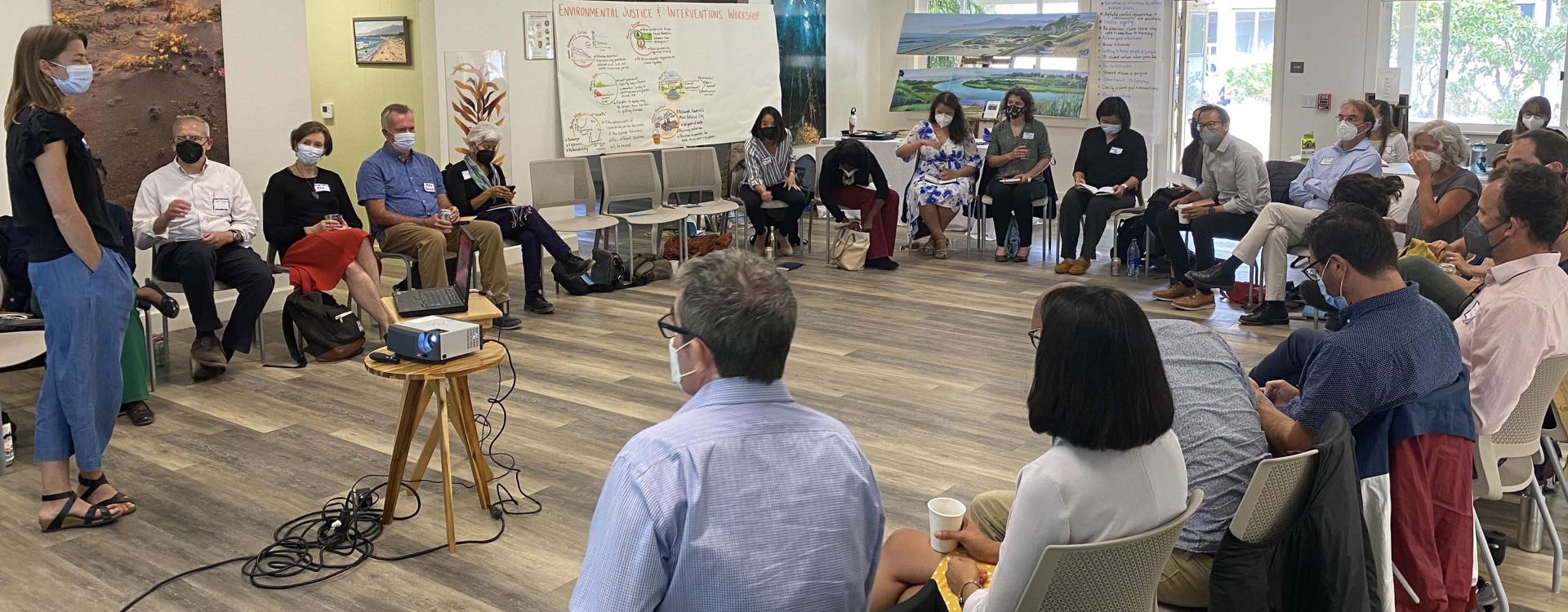
Ideas begin to fill the brainstorming board in the background as researchers and scholars gather for the first day of the environmental justice workshop. Photo Credit: Michaela Clemence
The climate crisis is an impartial phenomenon; however, its effects are not. They vary widely from one community to another, shaped by geography, society and history. Understanding this dynamic, and pinpointing our solutions, is an important focus in the growing field of environmental justice.
Researchers and scholars from around the world met at UC Santa Barbara to discuss innovative approaches to researching and addressing environmental injustices. A diverse group of 27 participants — including sociologists, environmental economists and ethnic studies scholars — visited the university’s Coal Oil Point Reserve Nature Center for two days of presentations and discussions.
“We wanted to really dig into assumptions and have a frank conversation around how we think about, and approach, research and interventions addressing environmental injustices,” said Michaela Clemence, the executive director of UCSB’s Environmental Markets Lab (emLab). “We wanted to discuss how to bring together different kinds of expertise, methods and perspectives in order to inform with equitable environmental solutions going forward.”
The two-day workshop, hosted by emLab, was envisioned and planned by an interdisciplinary steering committee comprising UCSB faculty members Christopher Costello, David Pellow, Kyle Meng and Tamma Carleton, as well as University of Oregon sociologist Julius McGee and University of Oklahoma sociologist Ian Carrillo. The Environmental Defense Fund (EDF) provided the finances for the event and research leading up to it.
Topics were broad and varied. Carrillo spoke about the impact climate change has on the exploitation of laborers in South American sugar plantations, an issue with deep historical roots. Meanwhile, University of Oregon’s Laura Pulido discussed how white nationalism is spilling into seemingly unrelated issues like climate change mitigation and adaptation. Rabid polarization, a threatened yet powerful minority, and the complex crossroads of group identity have contributed to some dismissive, even derisive attitudes toward climate issues, she explained.
University of Kentucky’s Lala Ma found racial disparities in federal buyouts of properties in flood-prone areas. While no one in these programs secures the full market price of their home, she found that Black and Hispanic households received 8–10% lower than their white neighbors. This sentiment was echoed by Costello, emLab’s research director, who spoke about how race affects the success of people who must relocate due to environmental hazards. Climate adaptation could exacerbate the gap between the rich and poor, the privileged and disadvantaged, Costello emphasized.
Although the presentations were edifying, their main purpose was to provide fodder for additional discussion and reflection.
The staff at emLab are synthesizing the results of the workshop to share with the Environmental Defense Fund and to discuss how it could catalyze future interdisciplinary research. Two EDF members who attended the event — chief economist Suzi Kerr and Matthias Fripp —will share key insights with their colleagues.
Billing itself as a “think-and-do tank,” emLab seeks to not only understand the issues society faces, but to put solutions into action. This is where relationships with government agencies, NGOs and organizations like EDF bear fruit.
EDF and emLab put together this workshop to help build a community of scholars who feel they can collaborate with each other on issues at the intersection of science, society and culture. Moreover, Clemence hopes it sets in motion conversations that will lead to future research collaborations and further action.